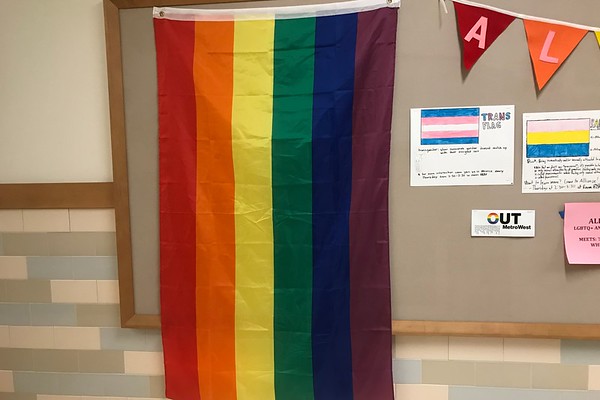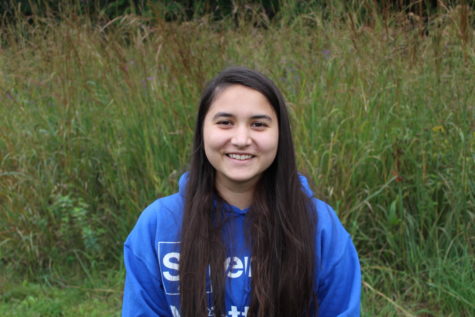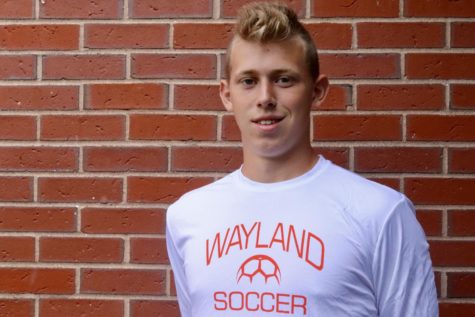WW ’19: Realizing who you are takes time: alliance hosts panel for sophomores

Credit: Max Brande
A few members of Alliance held a panel discussion for the sophomore class during winter week where they answered many questions from students. “We just want to be a resource, and if you couldn’t make it to the panel, our doors are always open,” senior Emma Marton said.
March 5, 2019
Students all around Wayland High School are members of the LGBTQ+ community, but not everyone knows who they are. Three resident members of the LGBTQ+ community held a panel in the lecture hall on the morning of Friday, Feb. 1 to begin the final day of Winter Week. This panel was designed to offer a hint of exposure to the attending sophomore class.
The event was designed to help students understand the world of the LGBTQ+ community and what it’s like to live as a member. Panelists were free to discuss their experiences, and students could ask about any ideas that intrigued them.
“The panel is really an opportunity for our fellow students to comfortably ask us questions about what it’s like to be LGBTQ+ in our school,” panel member Emma Marton said.
The panel began by introducing the three students who ran the panel, which was followed by opening up to the audience for questions. Among these questions was, ‘Who did you first come out to?’ An anonymous panel member claimed that it was much easier to come out first to their friends. Marton added that she told her brother first. However, it wasn’t easy for her.
“Realizing who you are takes time,” Marton said.
One of the main topics that the panel discussed was different gender identities. The idea of being transgender is not new, but the public has only recently started to become more aware and accepting of the trans community. Certain concepts such as the distinction between sex and gender – and the fact that the two don’t always align – may be tricky for some people to grasp, which is why the panel welcomed questions on the topic. Since anonymous relates to this part of the community personally, they readily answered their classmates’ burning questions about gender identity and how that relates to their life.
“There were a few [questions] directed at me because of my name change,” anonymous said. “I’m non-binary and I use they/them pronouns, so there were a few questions from my grade where people were specifically asking about me. Mostly, it was just general questions about us and our feelings about [issues] and how other people should address us.”
Audience members expressed the effectiveness of the panel after the event. Many students left with a better understanding of the LGBTQ+ community than they walked in with, which is just what the panelists had hoped. One of the most important concepts that students took with them was how to respect the identities of others.
“I learned a lot about the LGBTQ+ community, and now I know how to properly respect people in that community and go about regarding people in the most respectful way possible,” sophomore Lindsey Biggs said.
Some students found the experience eye-opening. Through their discussion, the panelists were able to show some of their audience members that everyone’s experience is different, and that some common beliefs about the community simply aren’t true or don’t apply to some members. For some, this changed the way they thought about the community.
“I’ll take away that I didn’t know people had such a hard time realizing who they were,” sophomore Will Munroe said. “Whenever people have talked about it was always clear that you knew from your first crush if you were gay or straight, and in middle school I learned that you could be bi [sexual], pan [sexual], and I think there a few others, but I really didn’t know that it took you that long to figure out who you were, I always thought that you knew from the second you were born.”
With the aid of the discussion held that morning, panelists hope that WHS continues to move towards being an accepting environment for all. The school has been making strides towards this goal, and it doesn’t go unnoticed. Still, anonymous believes that there is always room for growth.
“I think there’s definitely always more work to be done,” the anonymous student said. “I think we need to do a better job overall of understanding that people of the LGBTQ+ community exist and that they are prevalent in every classroom. They need to be heard.”
Fortunately, there are many ways in which students can help bring the school towards that goal. Simply by respecting people’s identities and working to understand them without judgment, students can create a more positive atmosphere for their classmates. According to Marton, being aware of your actions and how you choose to treat others, even when you think they aren’t looking, makes a big difference when it comes to allowing others to feel welcome at school.
“Please don’t make jokes,” Marton said. “‘That’s so gay’ and ‘Did you just assume my gender?’ jokes aren’t as common at our school, but I do hear things like that sometimes, and it doesn’t take much to remind whoever said that that it’s offensive. Assumptions and judgments about anybody are never good. I think that’s just good advice, but especially when it comes to somebody’s sexuality or gender. If you see somebody going into a bathroom you think is wrong or wearing clothes that don’t seem normal or acting ‘differently’, don’t stare. It doesn’t really affect you, and the person will notice those looks and feel bad.”
Being able to ask questions is vital when it comes to understanding anything. This is why the Alliance welcomes students to ask about topics relating to the LGBTQ+ community. They strive to provide a safe space for discussion, and they serve as a good resource for students who are seeking clarification, information and of course, support.
“In the end, we just want to be a resource, and if you couldn’t make it to the panel, our doors are always open,” Marton said.
Editor’s Note: One student interviewed requested to remain anonymous. Their name is referred to as “an anonoymous student” throughout the article.
Click the logo for full coverage of Winter Week 2019





![Last Wednesday, the Wayland School Committee gathered to discuss a number of topics regarding the health curriculum and Innovation Career Pathway course. Another large topic of conversation was the ways to potentially mitigate distracting cell phone usage. "These [phones] are going to distract your learning and social relationships," Superintendent David Fleishman said. "That's concrete right there."](https://waylandstudentpress.com/wp-content/uploads/2025/06/Screenshot-2025-06-04-at-9.49.31 PM-1200x886.png)



























![Troy Hoyt finishes the Boston Marathon, running for the Hoyt Foundation. T. Hoyt is the son of Hoyt Foundation CEO Russ Hoyt.
“[Running a marathon] might seem like a big thing, when it’s presented to you at first, but if you break it up and just keep telling yourself, “Yes, you can,” you can start chipping away at it. And before you know it, you’ll be running the whole 26 miles, and you won’t even think twice about it.” T. Hoyt said.](https://waylandstudentpress.com/wp-content/uploads/2025/04/C36E8761-1CBB-452E-9DF2-543EF7B1095E_1_105_c.jpeg)















































